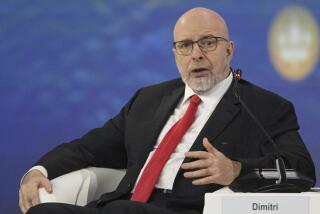Sessions’ contact with Russian ambassador during campaign sparks an uproar
U.S. Atty. Gen. Jeff Sessions had two separate meetings with the Russian ambassador to the U.S. during the presidential campaign, interactions the adviser to President Trump did not disclose to Congress during his confirmation hearing last month.
Sessions didn’t reveal the contacts when asked what he would do if “anyone affiliated” with the campaign had been in touch with the Russian government. At the hearing, Sessions told members of Congress that he hadn’t talked with the Russians.
A Justice Department spokeswoman confirmed the conversations with Russian ambassador Sergey Kislyak took place but said, “There was absolutely nothing misleading about his answer” to the question.
The revelation comes amid increased calls by Democrats for Sessions to recuse himself from an investigation into tampering by Russians in last year’s presidential election. Democratic House Minority Leader Nancy Pelosi (D-San Francisco) went further, calling for Sessions’ resignation and accusing him of “lying under oath.”
“Sessions is not fit to serve as the top law enforcement officer of our country and must resign,” Pelosi said in a statement. “There must be an independent, bipartisan, outside commission to investigate the Trump political, personal and financial connections to the Russians.”
Rep. Adam Schiff (D-Burbank), the ranking member of the House Intelligence Committee, tweeted Wednesday night, “If it’s true that Sessions failed to disclose his meeting with Kislyak, he must recuse himself [from the Russia investigation]. This is not even a close call; it is a must.”
In a statement Wednesday night, Sessions said, “I never met with any Russian officials to discuss issues of the campaign. I have no idea what this allegation is about. It is false.”
According to the Associated Press, Sessions had more than 25 conversations with foreign ambassadors last year in his role as a senior member of the Senate Armed Services Committee, and had two separate interactions with the Russian ambassador, Sergey Kislyak, the department said.
One was a visit in September in his capacity as a senator, similar to meetings with envoys from Britain, China, Germany and other nations, the department said.
The other occurred in a group setting following a Heritage Foundation speech that Sessions gave during the summer, when several ambassadors — including the Russian ambassador — approached Sessions after the talk as he was leaving the stage.
Revelations of the contact, first reported by The Washington Post, triggered calls from members of Congress for Sessions to back out of any involvement in the FBI’s probe.
Asked by reporters Monday about the prospect of a recusal, Sessions said, “I would recuse myself from anything that I should recuse myself on.
At the confirmation hearing in January, Sen. Al Franken of Minnesota asked Sessions about allegations of contact between Russia and Trump aides during the 2016 election.
He asked Sessions what he would do if there was evidence that anyone from the Trump campaign had been in touch with the Russian government during the campaign.
Sessions replied he was “unaware of those activities.”
Then he added: “I have been called a surrogate at a time or two in that campaign and I didn’t have, did not have communications with the Russians, and I’m unable to comment on it.”
Flores, the Justice Department spokeswoman, said that response was not misleading.
“He was asked during the hearing about communications between Russia and the Trump campaign — not about meetings he took as a senator and a member of the Armed Services Committee,” she said in a statement.
Franken, in a statement Wednesday night, said he was troubled that the new attorney general’s response to his question was “at best, misleading.” He said he planned to press Sessions on his contact with Russia.
“It’s clearer than ever now that the attorney general cannot, in good faith, oversee an investigation at the Department of Justice and the FBI of the Trump-Russia connection, and he must recuse himself immediately,” Franken said.
Separately in January, Sen. Patrick Leahy, a Judiciary Committee Democrat, asked Sessions in a written questionnaire whether “he had been in contact with anyone connected to any part of the Russian government about the 2016 election, either before or after election day.”
Sessions replied simply, “No.”
The Associated Press contributed to this report.
Twitter: @dakotacdsmith
ALSO
Grade the president: Here’s how you think Trump is doing so far
Trump said he would isolate his family businesses, but they have already seeped into the White House
UPDATES:
10:55 p.m.: Updated with Times reporting.
9:30 p.m.: Updated with Sessions’ response.
This story was first published at 8:25 p.m.
More to Read
Get the L.A. Times Politics newsletter
Deeply reported insights into legislation, politics and policy from Sacramento, Washington and beyond. In your inbox three times per week.
You may occasionally receive promotional content from the Los Angeles Times.











